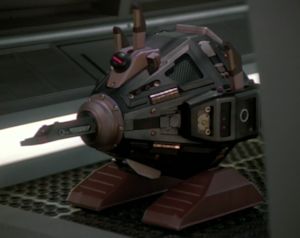| |||||||||||
| |||||||||||
|
Spoiler-free notes: The episode has only just started, but I already like the character of Dr. Farallon, the woman in charge of the particle fountain project. She represents an attitude that is extremely common among scientists and engineers who get so wrapped up in their own vision and the possibilities of their work that they lose sight of reality. La Forge, then, is playing the part of peer review, the objective outsider who is capable of an unbiased opinion. Finally, a thematic undercurrent that has some meat to it. "Doctor, there is a big difference between you and a virus, and yet both are alive." Not true. Viruses lack a cellular structure and independent metabolism, and they cannot naturally reproduce on their own. At best, they are organisms on the verge of life, self-assembling organic molecules with a gene structure. Maybe, in the 24th Century, the definition of life has changed as a result of exploring new life and new civilizations, and Data is actually correct, but here and now, viruses are not considered living things. They talk about whether or not it is ethical to use the exocomps if it can be determined that they are alive, but nobody questions the ethics of Data's cat or Picard's fish. Even if we don't count domestication, do we not use animals--horses, oxen, etc.--for other kinds of slave labor? Are they less alive than the exocomps? Man, Dr. Farallon can be a smug bitch. This is a definite improvement over the last few episodes in terms of serious storytelling. The science-fiction elements are much more thoughtful and provocative, and the character development is much clearer, building on the ideas of older stories instead of recycling them. The issue of what defines life has been dealt with on TNG before--in "Home Soil" and, more importantly, "The Measure of a Man"--but this approaches the problem from a different perspective: contemplating the notion that we might invent artificial intelligence wholly by accident instead of by design. It gives Data a cause that fits him and shows that there are things for which he is willing to sacrifice everything. I wouldn't list it in TNG's top 10 episodes or anything, but it is a clever little tale with genuine heart that tackles a philosophical problem that can only be explored through science-fiction. | |||||||||||
|
| |||||||||||
| |||||||||||
|
Copyright ©2012 e. magill. All rights reserved.
|

